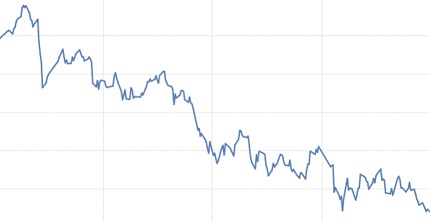
One income-investment newsletter writer says it is beyond ridiculous when his customers complain that his recommendations, that they purchased, fall in price. His comeback reply, “a loss isn’t really a loss! This is because you’re still receiving the income and you can purchase more at a lower price at that point, which slightly increases your investment yield.”
My oh my. I’m afraid the reality is that: a capital loss is actually a real loss. Whether you realize the loss with a sale or not, you still have a capital loss. While he believes if you hold forever, then capital losses are irrelevant. (This is untrue, you always have opportunity costs – whether you acknowledge them or not). The fixed-income securities market is a slightly more sophisticated market than the stock market, and in general, there is usually a logical reason that a publicly-traded security, with a big following, is falling in value.
In my opinion, this newsletter writer has a dangerous blind spot from 2 investment risks:
1. Interest rate risk. When interest-rates rise on securities that are comparable to your fixed-income investment, then your investment will also fall in value. Conversely, if rates fall then your security will rise in value. When general interest rates are rising then the pricing of nearly all bonds fall. Interest rates today have been slightly rising from historic lows, leaving a whole lot of room for interest rates to rise across the yield curve. This would permanently reduce the price of any income security that doesn’t have a maturity date.
2. Impairment risk. Impairment refers to the company having a more difficult time continuing its payout rate of interest or dividends. As the potential reduction in payouts grows (and possibly a reduction in the credit rating), then the price of the security falls to reflect the potential future-reduced investment yield for current investors. This impairment may be company specific, industry specific, or from the general economy.
As an example, I owned a REIT that only held AAA mortgages and barely moved in price for 13 years. What could be more solid? Even though their mortgages remained stable, the company imploded in 2007 from leverage: the company’s lenders called their loans and no one would offer them new funding. While the dividends from the REIT were great, when the price stumbled, I was quick to exit with only a 12% capital loss as the price continued plummeting, all the way to zero. The company ceased operations just months later. Even though the company’s assets remained solid the entire time, the capital structure of the company was not stable at all. Investors recognized this risk as the shares dropped in price. This scenario occurs all the time: seemingly stable securities, funds, or companies are stung by recessions, interest rates, lawsuits, or unusual situations, and then disappear. By ignoring capital losses on your securities, you may end up riding them all the way down to an exchange delisting and needlessly lose 100% of your investment.
This newsletter writer is not the first investor or investment professional that has this beginner viewpoint. However, if you were some kind of financial fiduciary claiming that “a loss isn’t really a loss,” that would probably prompt your compliance officer to immediately resign, your accountant and lawyer to walk out the door, and trigger the licensing authorities to take a very close look at what you’ve been doing.
Instead, I recommend acknowledging and dealing in reality by recognizing that any capital loss is a real loss at that time. Plus, take a much closer look at the security, company, or fund. Hopefully, before you made your purchase, you created some money management rules for reducing, exiting, or hedging your position to avoid any large losses. Avoiding large losses is the #1 rule for all professional investors, including Warren Buffett who considers it the only rule for investing. And you cannot avoid large losses if you “pretend” they aren’t real.
